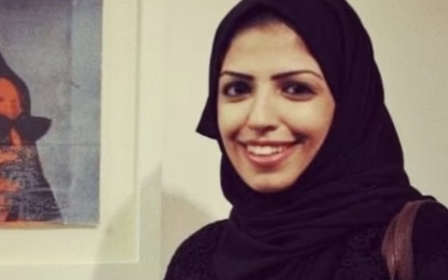Saudi fitness teacher, jailed for supporting women's rights, target of sexual harassment campaign

A Saudi activist and fitness instructor sentenced to 11 years for her choice of clothing and supporting women’s rights is being sexually harassed in prison, her sister and a rights group says.
In a phone call this month, Manahel al-Otaibi, 30, told her family that a group of people were following her around Malaz Prison, touching her and making sexual comments, trailing her into bathrooms and disrupting her sleep, her sister, Fouz, said.
“They follow her everywhere,” Fouz al-Otaibi told Middle East Eye.
Fouz said her sister described the people following her as women who are “bigger than usual” and have bodies that look male. Before she could say more, the call was cut.
“They took the phone directly from her,” Fouz said.
New MEE newsletter: Jerusalem Dispatch
Sign up to get the latest insights and analysis on Israel-Palestine, alongside Turkey Unpacked and other MEE newsletters
Otaibi was arrested in November 2022 over tweets using hashtags in support of women’s rights and for posting a photo of herself in a mall without an abaya on Snapchat.
She was originally charged with violating the kingdom’s Anti-Cyber Crime Law. But when her case moved from a criminal court to the Specialised Criminal Court (SCC), she was also charged with terrorism offences, rights groups have said.
After a trial held in secret and represented by a state-appointed lawyer, Manahel was sentenced to 11 years this January, adding to a growing list of Saudis imprisoned in the past three years for speaking out on social media.
'We’ve come to a new phase. It’s a pure police state now and people live under fear'
- Lina al Hathloul, Alqst
Lina al-Hathoul, head of monitoring and advocacy at Saudi Arabian human rights group Alqst, estimated that Otaibi’s case is among at least 200 that she is following right now that fall in this category.
One pattern Hathloul has seen is that many of those arrested were commenting on topics that the Saudi government has embraced in its efforts to reshape its global image, like the flagship economic programme Vision 2030, mega-city projects like Neom, and women’s rights.
“They just want to muzzle everyone on topics that could be counter-productive for their PR,” Hathloul said.
Otaibi is one of three sisters in her family who have been targeted by Saudi authorities for publicly challenging the status quo of women in the kingdom, including using hashtags to protest the restrictive guardianship system through their popular social media channels.
Her sister, Maryam, a prominent women’s rights activist, remains in Saudi Arabia on a travel ban imposed as a result of her activism. Fouz, also a women's rights activist and social media influencer, fled in 2022 after being summoned to a police station and is seeking asylum in the United Kingdom.
Hathoul said the three sisters have “are going through hell”, but their situation is not unique these days among the scores of cases she’s following in Saudi Arabia.
“What is exceptional is that they’ve dared to speak about it and that they were famous before even going to jail,” she said. “But to be very honest, with the cases we document, it’s really part of the pattern.
“We’ve come to a new phase. It’s a pure police state now and people live under fear.”
Abuse in prison
This is only the latest episode of alleged abuse Manahel al-Otaibi has faced since she was first imprisoned in 2022.
Last September, Alqst reported that prison inmates had beaten and bitten Manahel and threatened to kill her. When Manahel complained, she was put in solitary confinement.
Upon her release from solitary, she was placed in a cell with drug addicts, Alqst said. In November, she was put in solitary confinement for over five months. She spent her 30th birthday in a small room, unable to see outside.
On 14 April, when she was released from solitary again, she called her family and told them her leg had been broken during a brutal beating and she had been denied medical treatment.
The allegations of harassment come weeks after Manahel was put back into the prison’s general population, Fouz said.
The Saudi Ministry of Foreign Affairs and US embassy did not respond to requests for comment.
Hathloul said Otaibi’s experience is similar to other cases of political prisoners, including Salma al-Shehab.
The Leeds University doctoral candidate and mother of two was sentenced to 34 years in prison and a 34-year travel ban in 2022 over tweets in support of women's rights and imprisoned Saudi political prisoners. Her prison sentence was later reduced to 27 years.
'If you wanted them to have humane conditions, then when they complain, you would have an investigation'
- Lina al-Hathloul, Alqst
Hathloul said Shehab has complained that some of the inmates held with her had recently been released from a psychiatric hospital and were violent with her. One was convinced that Shehab was her mother.
Mohammed al-Qahtani, a leading Saudi human rights activist who was arrested in 2012 for his role in helping to establish the Saudi Civil and Political Rights Association, was also held with inmates who had left a psychiatric hospital and beat him, Hathoul said.
“When they complain about such behaviour, they are the ones going to solitary confinement,” she said.
“It’s clearly punishment because if you wanted them to have humane conditions, then when they complain, you would have an investigation.”
Fouz said she believes the government is behind the abuse Manahel is experiencing, but the endgame is unclear to her.
She speculated that perhaps they are trying to get Manahel to respond and then charge her with further violations, or simply want her “confused and scared”.
Despite constantly worrying about Manahel and Maryam, who she described as having “an open ticket to prison”, Fouz said she did not regret speaking out, in the past or now.
She believes speaking out has helped keep her sisters safe and that their activism helped bring about the lifting of the driving ban for women in 2018 and saw the kingdom allow women over 21 to travel abroad without a male guardian's permission the following year.
But Fouz said she continues to receive videos and messages from Saudi women who are impacted by a guardianship system that leaves their husbands and male relatives with power over them.
Human Rights Watch and Amnesty International have said that the 2022 Personal Status Law, touted by Crown Prince Mohammed bin Salman as "a qualitative leap" in women's rights, enshrined discrimination against women which had previously been carried out through a set of uncodified practices and policies.
Recently, a 25-year-old woman contacted Fouz to say her husband and father beat her.
“When she called the police, they said, ‘This is a family thing and we won’t do anything for you’,” she said.
“This is the thing we are fighting for.”
Middle East Eye delivers independent and unrivalled coverage and analysis of the Middle East, North Africa and beyond. To learn more about republishing this content and the associated fees, please fill out this form. More about MEE can be found here.






